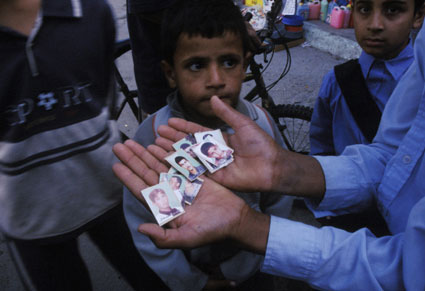
Gaza, 2002: Children from the Shati Refugee Camp show their collection of cards
commemorating Palestinians who have died in the conflict with Israel.
Photo: Darren Ell
|
 Gaza, 2002: Children from the Shati Refugee Camp show their collection of cards commemorating Palestinians who have died in the conflict with Israel. Photo: Darren Ell |
| Karima and family, recorded in Gaza City, April 21:
|
|
All through my stay in Gaza Karima has been inviting me to visit her family. They live in a part of Gaza city where most of the residents have settled illegally, and remain under permanent threat of demolition. Karima is unmarried and lives in a large household composed of her parents, younger sister, two married brothers with their wives and children, and her unmarried brothers. Her three unmarried brothers can't find jobs, and can't afford to study.
Karima is the only one who works. She cleans in UNRWA in the mornings, and in private homes in the afternoons. Her father, Abu Rateb, used to work for UNRWA but has recently retired. He used his indemnity to build this house. With Karima's salary they bought the doors, windows, and furniture. They have debts. The women in this family used to work in Israel, in agriculture, but that stopped with the first Intifada. The home here is more spacious than the one they had in Shati' camp (two small rooms), but they lose out here in other ways. Electricity is very expensive. There's no nearby kindergarden for her brother's children. They have to resort to private doctors. Their illegally built home could be demolished at any time. Only the fact that the neighbours are from the same region of Palestine gives them a crumb of security. This is another group session, with many voices and animated discussion. When I play the cassette back it's hard to distinguish individual voices and translate. But I like it because it conveys the atmosphere of an ordinary visit. Embedded in the conversation are the 'testimonies' of Karima's father and mother, Abu Rateb and Umm Rateb, as well as her own. I record with Abu Rateb first. He talks about leaving his village at the age of 17, and the hard early years in Gaza. Abu Rateb begins: |
and flocks, about 200 dunums. We fled between the Jews to Majdal, and from there we came to Gaza...Only I worked. There wasn't work in the '50s..."
Karima asks her father about the 'mowsam nebbi Reuben' (they are from the village of Reuben). He says that it always happened in the spring, and lasted for more than a month. People came from all over Palestine, but mainly from the Jaffa area, and pitched their tents. There was dancing and 'furasiya' (horse racing). The people of Reuben, of bedouin origin, combined agriculture with raising livestock, following water within a limited area. They lived in shelters that were partly camel hair, partly zinco. Umm Rateb is from a different village, Sikriyya, near Ramleh. In 1948 her family reached Deir al-Balagh on camels. A cruel step-mother forced her to work at age ten. At 18 she married Abu Rateb (suppressed giggles from the children suggest she was his second wife). She had brought up his orphaned siblings and looked after his mother as well as her own children. She worked outside the home, carrying sand on her head, selling firewood. An archetypal hard life, one that Karima seems fated to follow.
Umm Rateb begins: Karima tells more about the first Intifada, how the Israelis would break into the house and search; how most work stopped; how father got gassed and had to be hospitalized; how a brother-in-law was imprisoned; how school study levels dropped. Karima begins: |
[Zahira 'Attallah] [Maie Sarraf] Copyright©2005 |
|